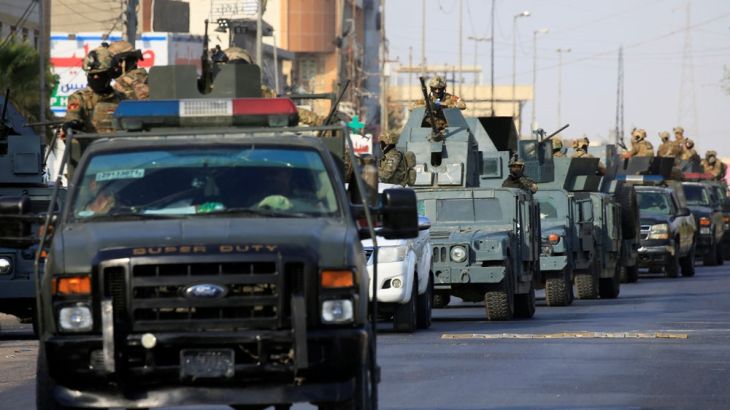Iraq: Calm returns to Basra after week of violent protests
Security reinforcements sent from Baghdad have stabilised the city after weeks-long protests turned violent last week.

Calm and order have been restored in Iraq’s southern Basra province after a week of violent protests over Iranian interference, unemployment, and poor public services left at least 15 people dead.
Troops sent from Baghdad have reinforced security personnel’s presence on Sunday, with government offices and marketplaces reopening after a quieter night.
Keep reading
list of 4 itemsIraq vows ‘severe’ response after attack on Iran consulate
Deadly Basra clashes as government office torched
Iraqi parliament meets as rival blocs vie for majority
Municipality workers were also out in force cleaning up the streets and carting away debris from the clashes.
Basra has been rocked by protests since Tuesday, with demonstrators setting ablaze government buildings, the Iranian consulate and the offices of pro-Tehran militias and political parties.
|
|
Anger flared after the hospitalisation of 30,000 people who had drunk polluted water.
Residents in the oil-rich region have for weeks complained of water and electricity shortages, corruption among officials and unemployment.
Hours before parliament met at an emergency session on Saturday, four rockets fired by unidentified assailants struck inside the perimeter of Basra airport, security sources said.
Staff at the airport, which is located near the US consulate in Basra, said flights were not affected.
The two leading groups in Iraq’ s parliament have demanded the resignation of Prime Minister Haider al-Abadi’s government over its inability to resolve the wave of unrest.
Defending his government, al-Abadi described the weeks-long protests in Basra over poor services and lack of jobs as “political sabotage” and charged that the crisis was being exploited for political ends.
His government has announced the allocation of an unspecified amount of extra funds for Basra, although demonstrators say that billions of dollars in emergency funding pledged in July has failed to materialise.
Death threats
On Saturday, a spokesman for an alliance of powerful Shia militias, many of them backed by Iran, vowed to respond against “those who are carrying out acts of arson and sabotage”.
The local commander, known as Abu Yasser al-Jaafari, said the lack of response thus far should not be taken as a sign of weakness.
|
|
Hours later, masked government troops in combat fatigues deployed in the city, setting up checkpoints and riding through the city centre in black pick-up trucks with heavy weapons mounted in the back. Security forces in Humvees deployed at intersections.
Naqeeb al-Luaibi, a local activist, said protest organizers had decided to suspend the demonstrations after receiving death threats from Iran-backed militias.
The militias accuse them of colluding with the US, which has long worked to curb Iranian influence in Iraq, allegations denied by the activists.
“We’ll suspend protests now to spare blood and we’ll return with a new approach,” he said. “We will not give up until our demands are met.”
Iraq is still without a government nearly four months after national elections in which no party won a majority.
Rival parliamentary blocs – one seen as friendlier to the US and the other closely allied with Iran – each claim to have assembled a governing coalition.
Iraq’s government has scrambled to meet the growing demand for public services and jobs but has been hindered by years of endemic corruption and a financial crisis fueled by diminished oil revenues and the costly war against ISIL (the Islamic State of Iraq and the Levant, also known as ISIS) group.
Basra is Iraq’s second-largest province and home to about 70 percent of the country’ s proven oil reserves of 153.1 billion barrels.
It is located on the Gulf, bordering Kuwait and Iran and is Iraq’ s only hub for oil exports.